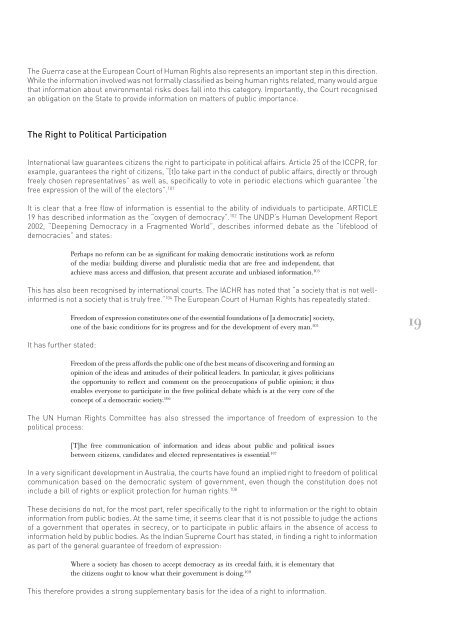Freedom of Information: A Comparative Legal Survey - Federation of ...
Freedom of Information: A Comparative Legal Survey - Federation of ...
Freedom of Information: A Comparative Legal Survey - Federation of ...
You also want an ePaper? Increase the reach of your titles
YUMPU automatically turns print PDFs into web optimized ePapers that Google loves.
The Guerra case at the European Court <strong>of</strong> Human Rights also represents an important step in this direction.<br />
While the information involved was not formally classifi ed as being human rights related, many would argue<br />
that information about environmental risks does fall into this category. Importantly, the Court recognised<br />
an obligation on the State to provide information on matters <strong>of</strong> public importance.<br />
The Right to Political Participation<br />
International law guarantees citizens the right to participate in political affairs. Article 25 <strong>of</strong> the ICCPR, for<br />
example, guarantees the right <strong>of</strong> citizens, “[t]o take part in the conduct <strong>of</strong> public affairs, directly or through<br />
freely chosen representatives” as well as, specifi cally to vote in periodic elections which guarantee “the<br />
free expression <strong>of</strong> the will <strong>of</strong> the electors”. 101<br />
It is clear that a free fl ow <strong>of</strong> information is essential to the ability <strong>of</strong> individuals to participate. ARTICLE<br />
19 has described information as the “oxygen <strong>of</strong> democracy”. 102 The UNDP’s Human Development Report<br />
2002, “Deepening Democracy in a Fragmented World”, describes informed debate as the “lifeblood <strong>of</strong><br />
democracies” and states:<br />
Perhaps no reform can be as signifi cant for making democratic institutions work as reform<br />
<strong>of</strong> the media: building diverse and pluralistic media that are free and independent, that<br />
achieve mass access and diffusion, that present accurate and unbiased information. 103<br />
This has also been recognised by international courts. The IACHR has noted that “a society that is not wellinformed<br />
is not a society that is truly free.” 104 The European Court <strong>of</strong> Human Rights has repeatedly stated:<br />
It has further stated:<br />
<strong>Freedom</strong> <strong>of</strong> expression constitutes one <strong>of</strong> the essential foundations <strong>of</strong> [a democratic] society,<br />
one <strong>of</strong> the basic conditions for its progress and for the development <strong>of</strong> every man. 105<br />
<strong>Freedom</strong> <strong>of</strong> the press affords the public one <strong>of</strong> the best means <strong>of</strong> discovering and forming an<br />
opinion <strong>of</strong> the ideas and attitudes <strong>of</strong> their political leaders. In particular, it gives politicians<br />
the opportunity to refl ect and comment on the preoccupations <strong>of</strong> public opinion; it thus<br />
enables everyone to participate in the free political debate which is at the very core <strong>of</strong> the<br />
concept <strong>of</strong> a democratic society. 106<br />
The UN Human Rights Committee has also stressed the importance <strong>of</strong> freedom <strong>of</strong> expression to the<br />
political process:<br />
[T]he free communication <strong>of</strong> information and ideas about public and political issues<br />
between citizens, candidates and elected representatives is essential. 107<br />
In a very signifi cant development in Australia, the courts have found an implied right to freedom <strong>of</strong> political<br />
communication based on the democratic system <strong>of</strong> government, even though the constitution does not<br />
include a bill <strong>of</strong> rights or explicit protection for human rights. 108<br />
These decisions do not, for the most part, refer specifi cally to the right to information or the right to obtain<br />
information from public bodies. At the same time, it seems clear that it is not possible to judge the actions<br />
<strong>of</strong> a government that operates in secrecy, or to participate in public affairs in the absence <strong>of</strong> access to<br />
information held by public bodies. As the Indian Supreme Court has stated, in fi nding a right to information<br />
as part <strong>of</strong> the general guarantee <strong>of</strong> freedom <strong>of</strong> expression:<br />
Where a society has chosen to accept democracy as its creedal faith, it is elementary that<br />
the citizens ought to know what their government is doing. 109<br />
This therefore provides a strong supplementary basis for the idea <strong>of</strong> a right to information.<br />
19
















